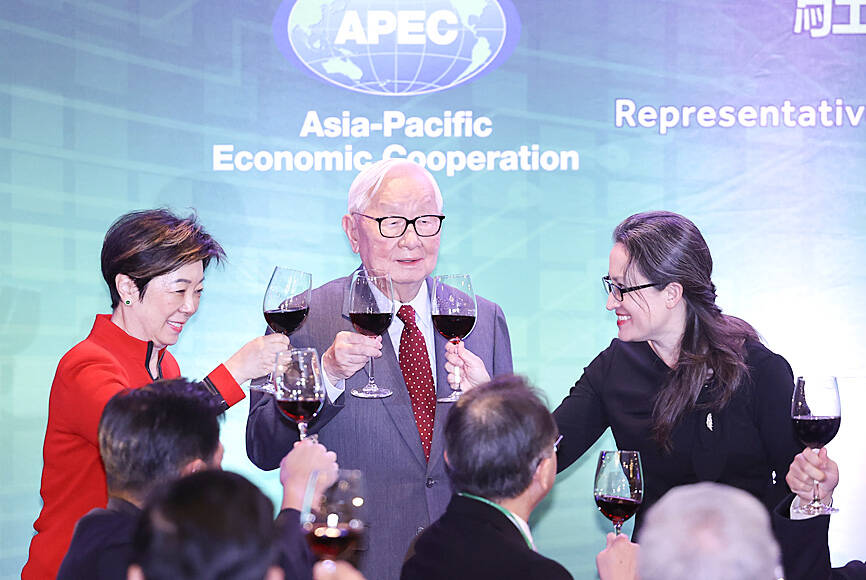Taiwan Semiconductor Manufacturing Co (TSMC, 台積電) founder Morris Chang (張忠謀) has arrived in San Francisco, where he is to represent President Tsai Ing-wen (蔡英文) at the APEC Economic Leaders’ Week.
Chang, 92, and his wife landed at 3pm on Tuesday and were greeted by Representative to the US Hsiao Bi-khim (蕭美琴).
Chang did not answer questions about whether he would meet with US President Joe Biden. The couple headed straight to their hotel, where they were greeted by a group of about 50 overseas Taiwanese and later attended a welcome banquet hosted by Hsiao.

Photo: CNA
Hsiao, who is expected to be Democratic Progressive Party (DPP) presidential candidate Vice President William Lai’s (賴清德) running mate in January’s presidential election, did not comment on the issue when she arrived at the hotel, where Taiwanese media are staying during the summit.
Before leaving Taiwan, Chang pledged to enhance the nation’s visibility at the APEC summit, which runs until tomorrow and is themed “Creating a Resilient and Sustainable Future for All.”
Speaking at Taiwan Taoyuan International Airport, Chang said he would engage with other APEC leaders and convey the nation’s willingness and ability to contribute to regional peace and prosperity in the Asia-Pacific region, and to develop more resilient supply chains.
He said he would also convey Taiwan’s readiness to work with partners on transitioning to green energy and bridging the regional digital divide.
Chang has served as the president’s envoy to APEC seven times. He first attended the annual APEC summit on behalf of then-president Chen Shui-bian (陳水扁) in 2006, and has attended the meeting on Tsai’s behalf six times.
Taiwan’s presidents have been unable to attend the annual APEC Economic Leaders’ Meeting due to China’s objections, even though Taiwan is a full APEC member under the name “Chinese Taipei.”
Meanwhile, 22 US senators on Tuesday issued a joint statement urging Biden not to make “more concessions” to China, including on Taiwan, when meeting Chinese President Xi Jinping (習近平) yesterday.
US Senator Jim Risch, a ranking member of the US Senate Foreign Relations Committee, led fellow Republicans in releasing the statement.
“It is paramount that Biden and his administration don’t give an inch on US policy on Taiwan,” the statement said, adding that it would be “one more grave error” regarding competition between the two superpowers.
“Few issues are more urgent than ensuring Taiwan has the capabilities and training it needs to deter Chinese aggression,” the statement said. “Vital US national and economic security interests, and the future of the entire Indo-Pacific region, are both at stake here.”

The Central Election Commission has amended election and recall regulations to require elected office candidates to provide proof that they have no Chinese citizenship, a Cabinet report said. The commission on Oct. 29 last year revised the Measures for the Permission of Family-based Residence, Long-term Residence and Settlement of People from the Mainland Area in the Taiwan Area (大陸地區人民在台灣地區依親居留長期居留或定居許可辦法), the Executive Yuan said in a report it submitted to the legislature for review. The revision requires Chinese citizens applying for permanent residency to submit notarial documents showing that they have lost their Chinese household record and have renounced — or have never

A magnitude 5.6 earthquake struck off the coast of Yilan County at 12:37pm today, with clear shaking felt across much of northern Taiwan. There were no immediate reports of damage. The epicenter of the quake was 16.9km east-southeast of Yilan County Hall offshore at a depth of 66.8km, Central Weather Administration (CWA) data showed. The maximum intensity registered at a 4 in Yilan County’s Nanao Township (南澳) on Taiwan’s seven-tier scale. Other parts of Yilan, as well as certain areas of Hualien County, Taipei, New Taipei City, Taoyuan, Hsinchu County, Taichung and Miaoli County, recorded intensities of 3. Residents of Yilan County and Taipei received

Taiwan has secured another breakthrough in fruit exports, with jujubes, dragon fruit and lychees approved for shipment to the EU, the Ministry of Agriculture said yesterday. The Animal and Plant Health Inspection Agency on Thursday received formal notification of the approval from the EU, the ministry said, adding that the decision was expected to expand Taiwanese fruit producers’ access to high-end European markets. Taiwan exported 126 tonnes of lychees last year, valued at US$1.48 million, with Japan accounting for 102 tonnes. Other export destinations included New Zealand, Hong Kong, the US and Australia, ministry data showed. Jujube exports totaled 103 tonnes, valued at

BIG SPENDERS: Foreign investors bought the most Taiwan equities since 2005, signaling confidence that an AI boom would continue to benefit chipmakers Taiwan Semiconductor Manufacturing Co’s (TSMC, 台積電) market capitalization swelled to US$2 trillion for the first time following a 4.25 percent rally in its American depositary receipts (ADR) overnight, putting the world’s biggest contract chipmaker sixth on the list of the world’s biggest companies by market capitalization, just behind Amazon.com Inc. The site CompaniesMarketcap.com ranked TSMC ahead of Saudi Aramco and Meta Platforms Inc. The Taiwanese company’s ADRs on Tuesday surged to US$385.75 on the New York Stock Exchange, as strong demand for artificial intelligence (AI) applications led to chip supply constraints and boost revenue growth to record-breaking levels. Each TSMC ADR represents